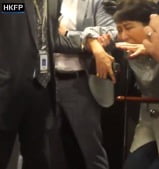Here you go – literally step-by-step coverage of the ongoing dramatics in Hong Kong’s Legislative Council today.
The pan-democrats in LegCo are all Hong Kong has in the way of democratic political representation. The rest of the chamber is for all practical purposes rigged to give pro-Beijing forces a majority. Elected local councils are just talking shops. The executive branch (ignore the fake ‘Chief Executive election’) comprises individuals hand-picked by the Chinese government for loyalty, obedience and all-round zombie-ness.
These pan-dems, their ranks depleted by expulsions, are the only formal obstacle the government faces in pushing through its extradition amendment. Being outnumbered, their only weapon is the use of delaying tactics. This risks looking disorderly or self-indulgent, but in this case it is the one hope of arousing enough public and international opposition to scare officials into withdrawing the measure – which would be a backdown by Beijing.

This is probably the last Legislative Council able to check government policies this way. As a result of procedural changes to prevent filibustering, the barring of pan-dems from the ballot and enhanced United Front activity, the assembly will likely be just a rubber stamp after the 2020 elections. The Chinese Communist Party doesn’t do independent legislatures.
Amazingly, there are still people out there who fantasize that democracy might have a place in Xi Jinping’s Hong Kong, China. Here is a retired expat civil servant arguing that a freely elected Legislative Council is both feasible and capable of delivering ‘real power to the people’, even if Beijing continues appointing the Chief Executive.
Some (especially older) pan-dems themselves suffer from this curious delusion. Benny Tai’s ‘Occupy’ civil-disobedience vision rested on it. Even a few moderate pro-establishment types like to think the CCP can concede a little control in order to mend divisions and fix local governance.
Sad truth: this is a Leninist mindset in charge, and it cannot share power. All it understands – and has – ultimately, is force. After the legislature, the CCP still needs to deal with the judiciary, media, academia, civil society and the rest.
